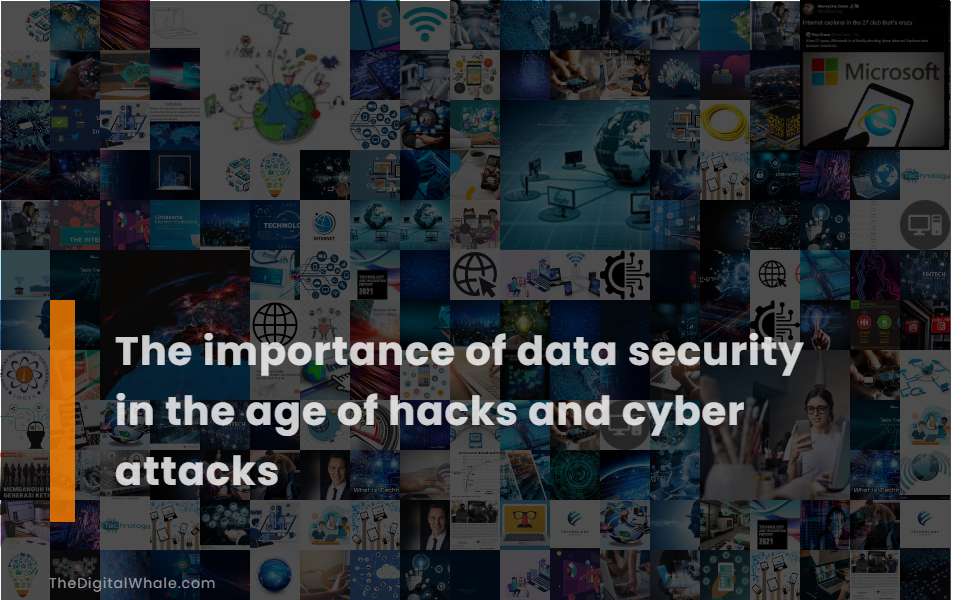The Importance of Data Security In the Age of Hacks and Cyber Attacks
What is the difference between cyber security and data security? What are some important factors in cybersecurity in the modern age? Let's find out more about The Importance of Data Security In the Age of Hacks and Cyber Attacks.

Protects Sensitive Information
Data security is essential for safeguarding sensitive information, including personally identifiable information (PII), financial data, and medical records. By employing strategies such as data classification, encryption, and strict access controls, organizations can prevent unauthorized access and ensure compliance with regulatory standards. It is crucial to protect sensitive data throughout its lifecycle, employing techniques such as encryption, data masking, and secure storage and transmission protocols. This comprehensive approach prevents the risks posed by cybercriminal activities, insider threats, and human error. For more information on these practices, you may explore the extensive resources available at UpGuard, which emphasize the importance of maintaining the confidentiality, integrity, and availability of data.
Prevents Data Tampering
Data security is crucial in preventing data tampering through measures such as encryption of data-at-rest and data-in-transit, role-based access controls, multi-factor authentication, and file integrity monitoring. These strategies ensure that even if data is tampered with, it cannot be modified in a meaningful way without detection. For a deeper understanding of these practices, you can visit the Cypress Data Defense Blog, where comprehensive insights into securing data integrity are provided.
Protects the Company's Reputation
Robust cybersecurity is crucial for protecting a company's reputation by safeguarding operational and financial data, maintaining customer trust, and preventing the severe reputational damage that can result from Cybersecurity Breaches. By ensuring that sensitive information is well-protected, businesses can uphold their credibility and customer relationships, which are essential components of sustained success in today's digital era.
Ensures Legal and Regulatory Compliance
Data security compliance is crucial for ensuring that organizations adhere to industry-specific laws such as HIPAA, SOX, and GDPR. These regulations mandate the secure handling of data to avoid severe penalties and reputational damage. By prioritizing Data Compliance, companies can effectively meet legal requirements, preventing fines, legal penalties, and potential harm to their reputation. Ensuring compliance not only safeguards sensitive information but also reinforces trust among stakeholders, as it demonstrates a commitment to protecting privacy and adhering to necessary legal standards.
Maintains Customer Trust and Confidence
Data security is crucial for maintaining customer trust and confidence by protecting sensitive information, preventing data breaches, and ensuring transparency in security measures. This approach helps in building and sustaining brand reputation and customer engagement. It's essential for businesses to have clear and transparent privacy and security policies, complemented by prompt communication about data protection measures. These practices, as emphasized by Tripwire, help build customer trust by demonstrating respect for their data and ensuring they feel safe and valued.
Related:
What are some benefits for older people to learn about using technology? What skills and knowledge do older workers need to work online? Let's find out more about What Young People Can Learn from Older Workers About Navigating the Digital World.
Provides Competitive Advantage
Implementing robust data security measures can establish trust with customers, ensure regulatory compliance, enhance operational resilience, drive innovation, and foster customer loyalty, all of which serve as significant competitive advantages in the market. As highlighted by Calamu, a proper data security strategy is essential for maintaining a competitive edge. Cybersecurity has evolved from merely being about risk management to becoming a decisive competitive advantage, as it drives growth by building trust, retaining customers, and integrating security into product development. Demonstrating compliance with data security and privacy frameworks such as SOC 2, ISO 27001, and NIST 800-53 can differentiate an organization from its competitors, attract new business, and build trust with customers, especially in regulated industries like finance and healthcare.
Avoids Additional Costs Associated with Breaches
Implementing robust cybersecurity measures significantly reduces the risk of data breaches, thereby avoiding additional costs associated with breaches, such as regulatory fines, legal fees, and the financial impact of reputational damage. Visit the Cybersecurity guide to learn more about how effective cybersecurity practices protect businesses against cyberattacks and data breaches, preventing the costly disruptions and financial losses that can result from such incidents, including the costs of recovery and compliance violations.
Prevents Unauthorized Access and Cyber Attacks
Data security is crucial as it protects all categories of data from theft and damage, defending against data breach campaigns and sophisticated cyber attacks by ensuring robust defenses against unauthorized access. Preventing unauthorized access involves a multi-faceted approach, including strong password policies, regular software updates, multi-factor authentication, employee security awareness training, and Network Access Control solutions to safeguard sensitive information and systems.
Ensures Business Continuity
Ensuring data security is crucial for business continuity as it protects critical assets from cyber threats, prevents data loss and downtime, and maintains operational resilience and reputation integrity. As highlighted in the comprehensive guide, this integration is vital for safeguarding critical data, preventing disruptions, and ensuring the integrity and availability of data necessary for ongoing business operations. By prioritizing data security, businesses can effectively defend against the increasing prevalence of cyberattacks, thus ensuring seamless and uninterrupted functioning.
Protects National Security and Critical Infrastructure
Data security is crucial for protecting National Security and critical infrastructure, as cyber threats from nation-states, transnational criminal organizations, and cyber criminals target critical sectors like energy, nuclear, water, and aviation, posing significant risks to national security, economic prosperity, and public health and safety. To learn more about measures being taken to secure these vital areas, visit the Cybersecurity and Infrastructure Security Agency, which plays a pivotal role in safeguarding our nation's assets.
Related:
Are there any benefits to working remotely? What are the benefits of working remotely? Let's find out more about The Benefits and Challenges of Working Remotely.
